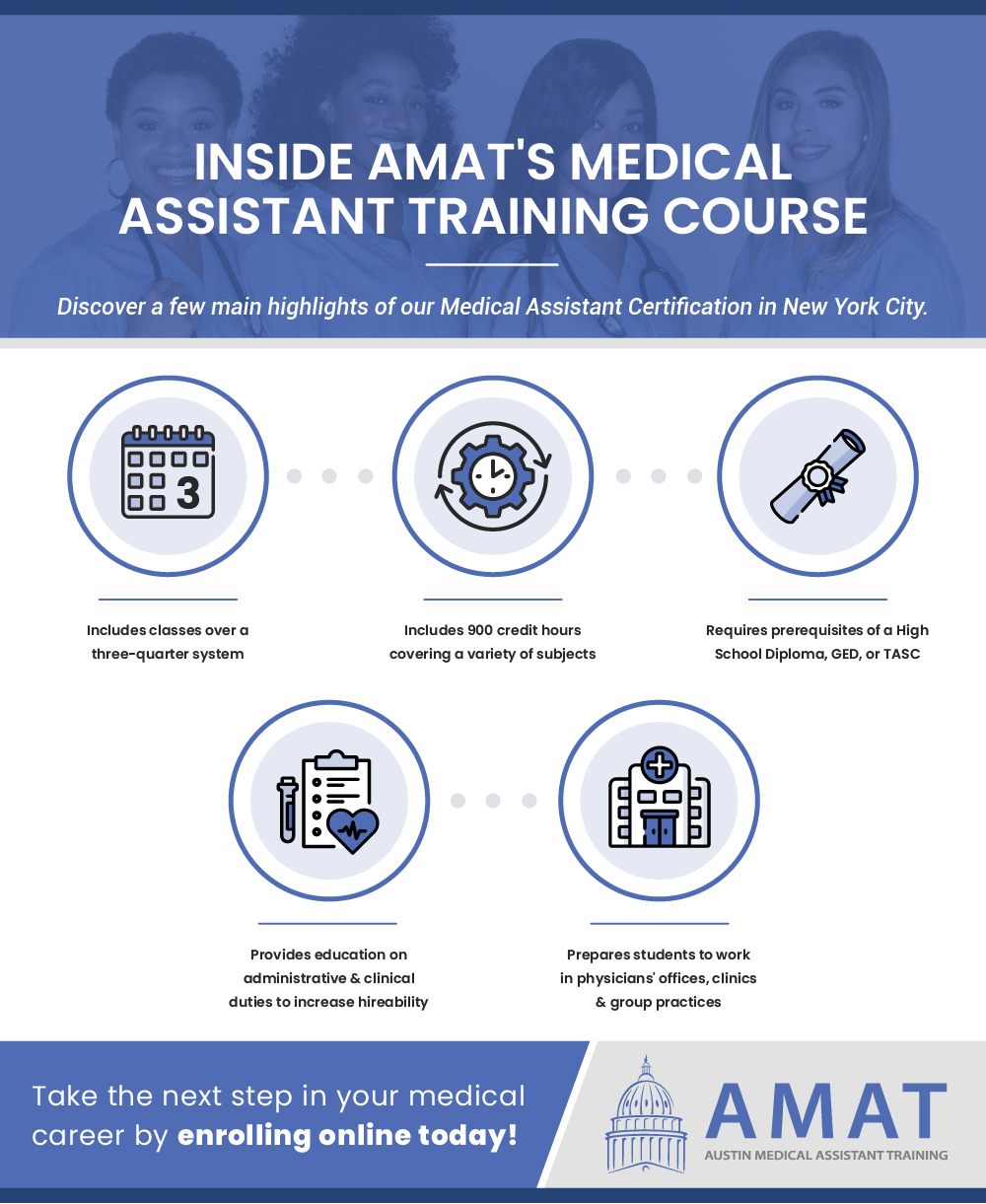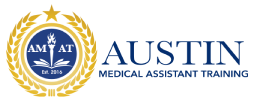
Medical Assistant Training Certification Program
The Medical Assistant program is a three- quarters program that prepares students to be multi-skilled allied health professionals specifically trained to perform in ambulatory settings, such as physicians’offices, clinics, and group practices and perform administrative and clinical procedures. The health care industry is slated to expand because of technological advances in medicine and the growth and aging of the population. Employment growth will be driven by the increase in the number of group practices, clinics, and other health care facilities that need a high proportion of support personnel, particularly the flexible medical assistant who can handle both administrative and clinical duties. Medical assistants work primarily in outpatient settings, a rapidly growing sector of the health care industry. Students must achieve a grade point average of 2.0 (C) or above in all program requirements. The Medical Assisting Program at AMAT has an average graduate satisfaction survey rate of 100% over the past two-year period. There are a number of support services available to students at AMAT so you can successfully complete the program and pass the certification exam offered by the American Association of Medical Assistants (AAMA).
Program Description
The AMAT Medical Assistant Training Certification NYC program is a three-quarters program that prepares students to be multi-skilled allied health professionals, specifically trained to perform in ambulatory settings, such as physicians’ offices, clinics, and group practices and perform administrative and clinical procedures. The healthcare industry is slated to expand because of technological advances in medicine and the growth and aging of the population. Employment growth will be driven by the increase in the number of group practices, clinics, and other health care facilities that need a high proportion of support personnel, particularly the flexible medical assistant who can handle both administrative and clinical duties. Individuals who enroll in our Medical Assistant Training certification programs work primarily in outpatient settings, a rapidly growing sector of the healthcare industry. Students must achieve a grade point average of 2.0 (C) or above in all program requirements. The Medical Assistant Training Certification NYC program at AMAT has an average graduate satisfaction survey rate of 100% over the past two-year period. There are a number of support services available to students at AMAT so you can successfully complete the program and pass the certification exam offered by the American Association of Medical Assistants (AAMA).

Medical Assistant Training Certification NYC Classes:
Medical Terminology (112) 40 hours
This course introduces the major body structures through the study of medical terms. Terminology related to diagnosis and treatment is also presented. The students would learn how to define and use the entire basic structure of medical terms and be
Clinical Procedures (MA120) 40 hours
Clinical Procedures for Medical Assistants will provide clear, step-by-step instructions for common office procedures such as taking vital signs, collecting and processing lab specimens, preparing patients for
Computerized Billing (MA145) 70 hours
Learn coding procedures, and insurance billing procedures. Students also learn through computerized billing simulations how to create, save, retrieve, edit, and maintain patient files. In addition, post payments to
Health Insurance (MA 135) 40 hours
This course about the All type of health insurances such as health maintenance organizations (HMOs), Preferred provider organizations (PPOs), Point-of-service (POS
Human Relations (MA131) 40 hours
This course about the Communicate effectively with any healthcare team member Spoke clearly with any healthcare member Write any needed patient notes Listen attentively
Computer Applications (MA101) 40 hours
This course introduces the essential concepts necessary to make effective use of the computer. Students achieve an understanding of what a computer can do, how it works, and how i
Urinalysis & Microbiology (MA125) 40 hours
This course explains how to assist Reproductive and Urinary Specialties in the preparation of clinical laboratory and microbiology urinalysis and understand the purpose of these routine tests.

Benefits of Choosing AMAT For Fast Medical Assistant Certification
Enrolling in the best medical assistant certification available in the New York City area is possible with AMAT. Not only does our organization set young medical professionals up for success by providing a large wealth of information and training — thus allowing them to excel academically — but also by providing numerous job placement opportunities. While our students are completing their classes, they can expect flexible hours and a multitude of hiring opportunities, as AMAT boasts a 100 percent job placement rate. Our staff invite you to learn more about our Medical Assistant Training Certification NYC program and to take the next step in your career!


AMAT Enrollment Prerequisites:
High School Diploma, GED, TASC or a foreign country high school diploma (Must be in English or translated into English)
The Program Is Available
Once the student has received books and supplies, AMAT will not accept any books and supplies back. Students that lose or damage any books or supplies may purchase them from the school at the prices listed below. Students are responsible for fees of any received books and/or supplies from the school if they cancel or are terminated from the program/ course.
Students of Medical Assistant program are encouraged to take the RMA exam given by:
- American Medical Technologists (AMT)
- National Health Career Association (NHA)
- American Medical Certification Association (AMCA)
Contact Us Today
